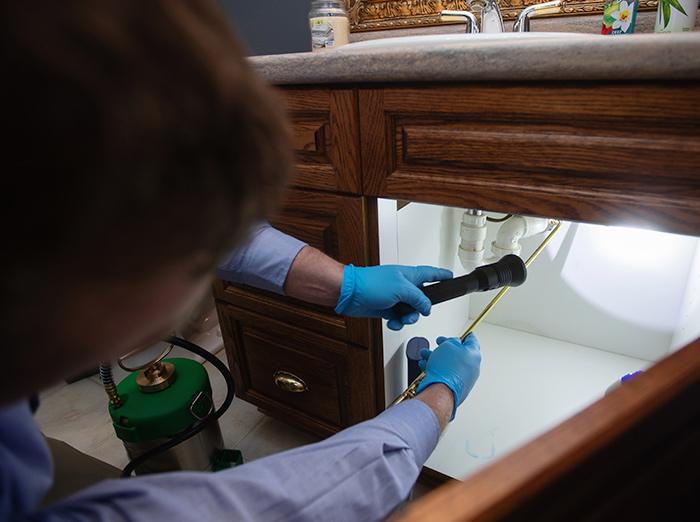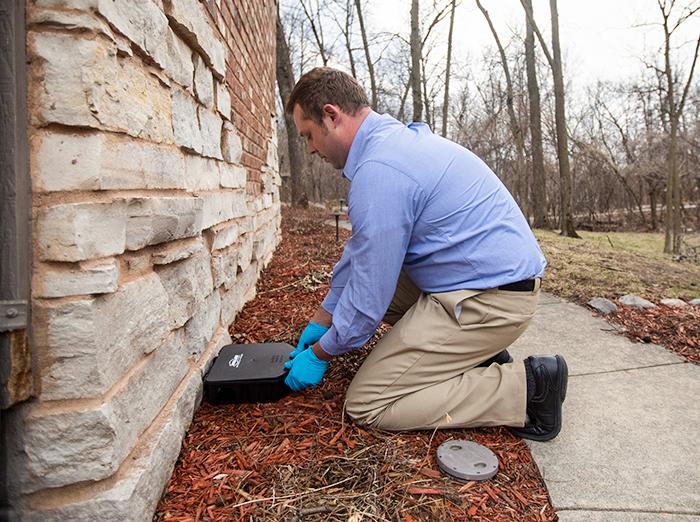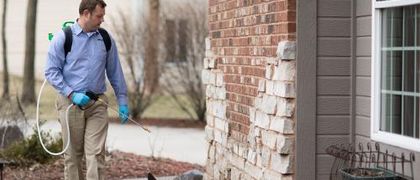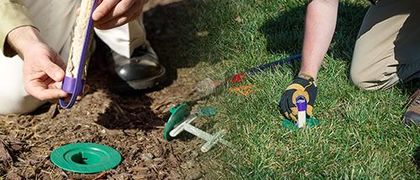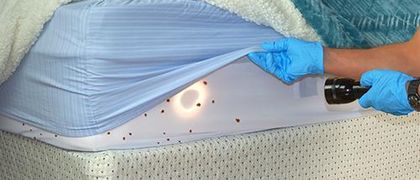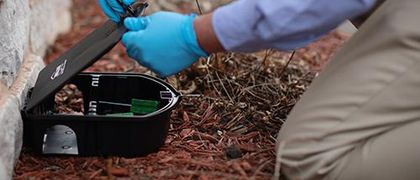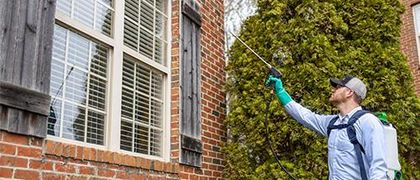Mice In The Basement
When you detect a warning sign that you have a mouse in your basement, you're going to have questions. Lots of questions. Today, we hope to shed some light on the mystery of how mice get into basements, and what they do after they find their way in. If your home has a crawl space, check out, "How Are Mice Getting Into My Crawl Space," for specific insights and tips that relate to your unique mouse control problem. And, as always, we're here if you need us. Miller Pest & Termite provides advanced Integrated Pest Management solutions for rodents and other pests in several Midwest communities including Omaha, Des Moines, and Kansas City.
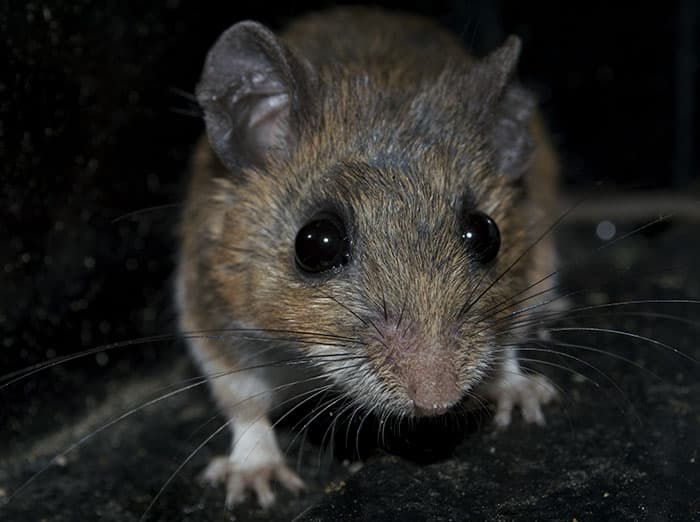
What you need to know about mice
There are a few mouse facts that can help you get a broader understanding of how mice get in and move about inside your home. Let's start with these, so you'll have a better picture of what is going on as you learn the details of how mice enter basements and move about in your home.
- A mouse can squeeze and wiggle through a gap the width of a dime. If it can get its head through, it can fit its body through.
- A mouse can leap thirteen inches straight up.
- A mouse can scale tree bark with its claws, just like a squirrel. It can use these claws to scale the exterior of your home or rough interior surfaces.
- A mouse has powerful jaws and strong teeth, which it can use to chew a hole through a board if properly motivated.
- A mouse has an incredible sense of smell and can detect food from a distance or through tiny gaps and holes that lead into a pantry or kitchen.
With so many abilities, it is no wonder mice can get into your basement. But how do they do it? Let's take a look.
Common ways mice enter basements
There are many common ways a mouse can get into your basement. These animals can also find unexpected pathways when unique conditions present themselves. Use these facts to help you understand the conditions of a potential infestation.
- Mice can squeeze through gaps around plumbing and wire utilities.
- Mice can squeeze under a door that has no sweep.
- Mice can nibble on weatherstripping and slip through a door seal.
- Mice chew on window frames and can slip past foundation windows.
- Mice chew on the sole plates of a home and squeeze in through wood holes.
- Mice can hide in exterior objects and get carried inside.
When mice get into your basement, it is a good idea to do something about them as soon as possible. They can cause trouble down there.
What mice do in your basement
When a mouse finds its way into a basement, it will respond to the new environment with natural instincts.
Unfinished basements
A mouse that gets into an unfinished space, may attempt to create a nest in an available hiding place. The first place to check is in the drawer of a stored dresser, or a similar hiding place. If you find a ball of soft material, you've found your mouse nest.
Finished basements
Mice don't like to live in a basement that is being used. If a mouse gets in through an exterior door and finds a finished basement, it is likely to run along the walls and gnaw its way into a wall void. Look for holes.
Do you have a mouse in your basement? When a mouse finds itself in your basement, it may explore it at night while you're sleeping. As it does this, it will leave tiny, black droppings for you to find. You may also detect a scent of urine. Mice use urine to create a map of their environment that only their noses can see. The best evidence of a mouse infestation is to find their soft, fluffy nests.
Where mice go after getting into your basement
You can expect a mouse to do things in your home that they would do in nature. They'll look for cavities to live in (like the drawer of a dresser), and they'll continually hunt for food. They love to live in wall voids because these voids feel like tree cavities. They can go up and down through walls using their natural abilities. When they crawl near a pantry or kitchen, they may smell food and chew a hole to get to the food.
Mouse prevention and control
There are primarily two ways to deter mice. You need to remove the "scent" of food and make it harder for mice to get into your home and move about indoors. We recommend sanitation, storing food in sealed containers, managing trash, sealing exterior entry points, and patching any holes you find indoors.
If you currently have a mouse infestation, contact a licensed pest control provider to exterminate mice and systematically address the conditions that led to the infestation. Here at Miller Pest & Termite, we offer effective rodent control services that include a thorough inspection, a customized rodent control plan, and our recommendations for making your home or business less appealing to mice and rats.
In addition to our stand-alone rodent control, our local pest control company also offers ongoing home pest control plans that stop mice, rats, and other common house-infesting pests from taking over! Check out our Miller Guard plan below or simply reach out for help!
Ongoing Home Pest Control Recommendation
Miller Guard
Our signature Miller Guard pest control plan stands out in the industry by giving you Full Pest Coverage and Zero hidden fees. It is designed to eliminate and prevent insect and rodent problems by targeting pest entry and exit points for maximum effectiveness. It includes an initial premium interior application, exterior applications, web removal, and wasp nest removal.
- Ongoing Preventive Services
- 29 Pests & Services Covered
- Initial Premium Interior Application
- Exterior Applications
- Rodent Control
- Wasp Nest Removal
- Cob-Web Removal
- 1-Year Service Agreement
Starting at:
$4999A Month
Free Quote Or Call (515) 518-8864

Additional Miller Guard Details
Pests Covered: Asian Beetles, Boxelder Bugs, Carpenter Ants, Carpet Beetles, Centipedes, Clothes Moths, Drain Flies, Earwigs, Fleas, Fruit Flies, Grain Beetles, Hornets, House Ants, Indian Meal Moths, Mice, Millipedes, Pill Bugs, Rats, Roaches**, Silverfish, Spiders***, Stink Bugs, Wasps, Weevils, Yellow Jackets
Service frequency will vary based on geography. The Miller Guard program does not include the following pests: honey bees, flies, lice, dust mites, mosquitoes, exterior ticks, ornamental/turf pests, slugs, snails, termites, wildlife, birds, and brown recluse spiders.
- Pricing does not include initial fee
- Must have credit card on file
**American, German & Oriental
*** Venomous & Non-venomous
Get Help Now!


